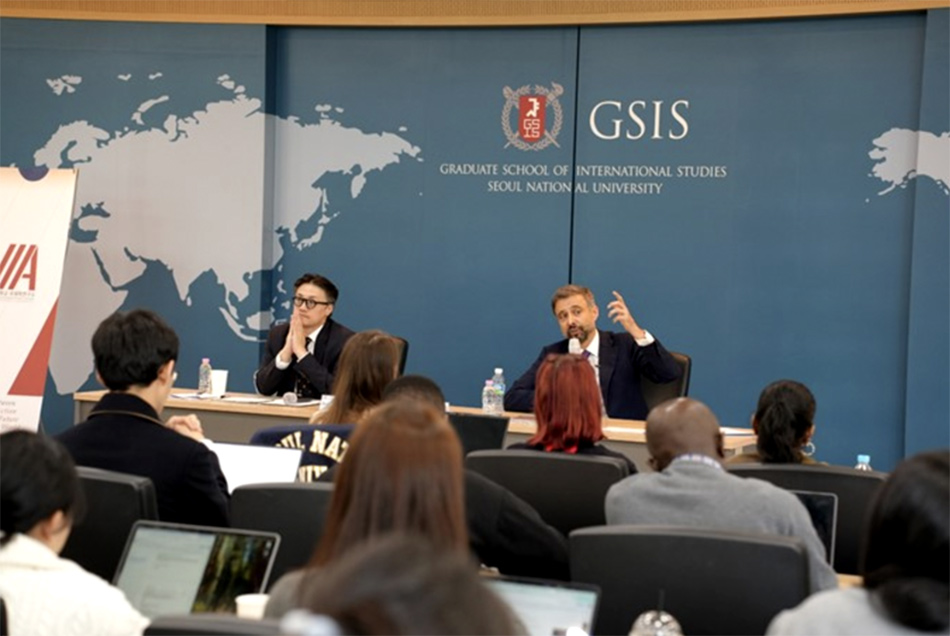On October 16, the Institute of International Affairs (IIA) at the SNU Graduate School of International Studies (GSIS) hosted its thirty-second Global Prominence Seminar (GPS). These seminars feature distinguished speakers discussing critical global issues such as social inclusion, international development, global commerce and transnational migration. The GPS series aims to encourage students to think critically about international challenges from a multidisciplinary perspective, preparing them for leadership roles in multinational corporations, think tanks, NGOs, and governments.
This GPS session featured President Alvaro Lario of the International Fund for Agricultural Development (IFAD) as the keynote speaker. The seminar was titled “Food for Thought: A Dialogue with IFAD President Alvaro Lario on World Food Day.” Lario, a leader in international development finance with over two decades of experience, has served as IFAD’s president since 2022. In 2024, he also took on the role of Chair of UN-Water. Lario’s presidency at IFAD takes place during a period of global instability, characterized by the lingering effects of COVID-19, climate change, and armed conflicts that have contributed to rising food and fuel prices. This seminar’s timing was especially significant as it coincided with World Food Day, celebrated annually on October 16 to draw attention to global hunger and malnutrition. Established in 1979, this day emphasizes the importance of access to nutritious, affordable, and sustainable food as a fundamental human right.

President Alvaro Lario of IFAD delivering his talk
During the seminar, President Lario delved into key challenges surrounding global food security and agricultural development. He traced the origins of IFAD to the food crisis of the 1970s and highlighted how the organization is now confronting a new wave of food insecurity. Recent food price shocks, exacerbated by the disruption of global supply chains due to Russia’s aggression in Ukraine, echo the challenges of the past. These events have contributed to a resurgence in global hunger and poverty, with one in ten people now affected. Compounding this, Lario noted that current geopolitical tensions, particularly in Europe, have weakened multilateral efforts to address these issues. As multilateralism—a critical tool for fostering global cooperation on food security—declines, many nations are shifting towards bilateral trade and development agreements, further complicating coordinated global responses.
IFAD serves as the only UN agency dedicated to supporting agricultural and food systems, particularly in rural regions where 80% of the world’s impoverished live. The organization targets the challenges faced by small-scale food producers, who depend on farming and fishing for their livelihoods, in connecting to bigger markets and scaling their businesses. Their efforts also go beyond focusing on agricultural production and encompass everything surrounding food systems, including access to energy, infrastructure, water, finance, and ecosystems.
Lario stressed that tackling food insecurity requires addressing inequality and embracing intersectionality to truly empower communities. Gender equality, in particular, is not only a moral imperative but also an economic one, as empowering women strengthens both local businesses and the wider economy. Further, it is important to recognize that food security initiatives are truly transformative only when local communities are actively engaged. As such, President Lario explained that he prefers to refer to those involved in IFAD’s programs as “participants” rather than “recipients.” Providing participants with resources to become self-sufficient requires time and strong institutional support. Accordingly, IFAD’s projects are not just about providing tools or mechanization to small-scale farmers, but about building the necessary infrastructure to treat farming as a sustainable business. This also means recognizing the importance of indigenous farming practices, ensuring local communities have governance over their land, and fostering resilient, sustainable food systems that address both environmental and social challenges.
During the Q&A session, GSIS students raised various questions, including IFAD’s work on climate change. Lario acknowledged that climate change—manifested in rising sea levels and extreme weather events—complicates development efforts. He stressed that the international community must continue supporting vulnerable nations, as abandoning them is not an option. Lario emphasized the importance of continued research into the intersections of environmental concerns, food security, and agriculture. Agriculture, he noted, is both a contributor to and a solution for environmental challenges. Sustainable agriculture projects hold great potential, but only if barriers like limited access to land, credit, and technology are addressed.
The Global Prominence Seminars (GPS) offer a unique platform for students and academics to engage with world leaders on today’s urgent challenges. These sessions offer not only deep insights but also a chance to develop the diverse perspectives needed to address complex global issues. For those eager to participate in future sessions, check out the GSIS IIA website (https://iia.snu.ac.kr) for details on upcoming seminars.
Written by Hyun Kyung Jung, SNU English Editor, jhyunk@snu.ac.kr

